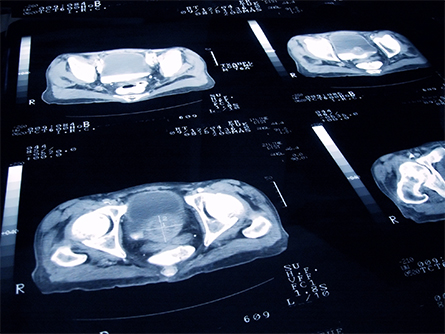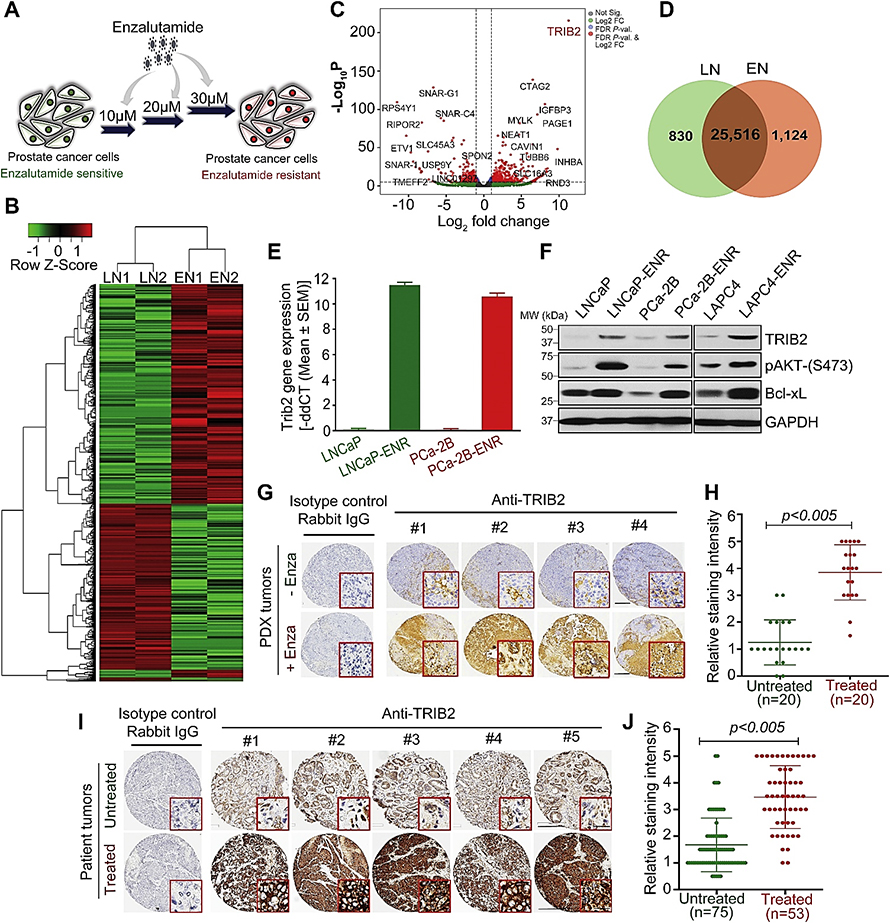A bridge to overcoming TRIBled prostate cancer
Prostate cancer is a leading cause of cancer-related deaths for men in the U.S., and the American Cancer Society predicts over 30,000 deaths from prostate cancer this year. Doctors use several strategies to combat this deadly disease.

Androgen, a male steroid hormone, plays a pivotal role in the initiation and progression of prostate cancer, so ablation or blocking of androgen signaling is one common treatment. The drug enzalutamide, an inhibitor of the androgen receptor, is a popular clinical choice for the treatment of prostate cancer. However, the treatment has limited efficacy.
“Enzalutamide is a popular drug, but resistance almost always develops,” researcher Jagadananda Ghosh said. “This prompted us to explore the underlying molecular mechanisms so that we can find a way to overcome this problem.”
A team led by Ghosh and Jitender Monga at the Henry Ford Health System in Detroit recently published a paper in the Journal of Biological Chemistry with news about a novel protein, Tribbles 2, or TRIB2, that scientists have found to be a functional biomarker of prostate cancer and a potential target for new, alternative therapies for enzalutamide-resistant, or ENZ-R, cancer that could extend the lives of patients.
To better understand the mechanism of ENZ-R, the team used both cell-based and animal models to characterize the expression of this protein and others related to the survival and phenotype of prostate cancer.
The pseudokinase TRIB2 regulates wing pattern and development in the fruit fly Drosophila and has analogs found across several species including humans, where it engages with intracellular signaling hubs to host a variety of growth and survival mechanisms. In a comprehensive gene array, the team found that TRIB2 is greatly overexpressed in ENZ-R prostate cells, and these cells also show elevated expression of an anti-apoptotic protein, Bcl-xL. When the team inhibited TRIB2 in the animal models using genetics and pharmacology, they saw a dramatic reduction in viable ENZ-R prostate cells and reductions in tumor volume.

To understand how TRIB2 promoted this drug resistance and caused these changes in survival and growth, the researchers characterized the expression of luminal cell, neuroendocrine and stemness markers. They found that cells overexpressing TRIB2 were depleted in luminal cell markers but rich in those associated with neuroendocrine and stemness phenotypes. They reproduced this result in tumor xenografts and documented using immunohistochemical staining.
“TRIB2 emerges as a new driver for trans-differentiation of prostate cancer cells from adenocarcinoma to neuroendocrine and to confer resistance to enzalutamide,” Ghosh said.
From this work, the team proposes that inhibiting AR signaling may have a negative impact on development of highly resistant and lethal prostate cancer cells. They have seen that kinase TRIB2 is not just a biomarker for ENZ-R cells but also functions in developing drug resistance. By comparing the phenotypic profile of these cells with ENZ-sensitive cells, they could identify a switch toward prostate cancer in the ENZ-R cells that display stemlike and neuroendocrine features, a potential cause of the resistance.
The dynamic plasticity of these cells in response to therapy may provide researchers with opportunity to alter treatment strategies and address this AR-independent resistance mechanism.
“We are working to dissect the regulation and role of TRIB2 using various in vivo models,” Ghosh said, “and we’re formulating strategies to interrupt the activity of TRIB2 to develop a new targeted therapy for aggressive, lethal prostate cancer.”
Enjoy reading ASBMB Today?
Become a member to receive the print edition four times a year and the digital edition monthly.
Learn moreGet the latest from ASBMB Today
Enter your email address, and we’ll send you a weekly email with recent articles, interviews and more.
Latest in Science
Science highlights or most popular articles

Building a career in nutrition across continents
Driven by past women in science, Kazi Sarjana Safain left Bangladesh and pursued a scientific career in the U.S.

Avoiding common figure errors in manuscript submissions
The three figure issues most often flagged during JBC’s data integrity review are background signal errors, image reuse and undeclared splicing errors. Learn how to avoid these and prevent mistakes that could impede publication.

Ragweed compound thwarts aggressive bladder and breast cancers
Scientists from the University of Michigan reveal the mechanism of action of ambrosin, a compound from ragweed, selectively attacks advanced bladder and breast cancer cells in cell-based models, highlighting its potential to treat advanced tumors.

Lipid-lowering therapies could help treat IBD
Genetic evidence shows that drugs that reduce cholesterol or triglyceride levels can either raise or lower inflammatory bowel disease risk by altering gut microbes and immune signaling.

Key regulator of cholesterol protects against Alzheimer’s disease
A new study identifies oxysterol-binding protein-related protein 6 as a central controller of brain cholesterol balance, with protective effects against Alzheimer’s-related neurodegeneration.

From humble beginnings to unlocking lysosomal secrets
Monther Abu–Remaileh will receive the ASBMB’s 2026 Walter A. Shaw Young Investigator Award in Lipid Research at the ASBMB Annual Meeting, March 7-10 in Washington, D.C.

